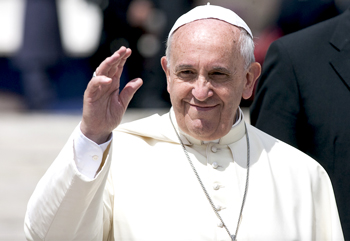Aboard the Papal Plane, June 27: Pope Francis said on Sunday that Christians and the Roman Catholic Church should seek forgiveness from homosexuals for the way they had treated them.

In the hour-long freewheeling conversation that has become a trademark of his international travels, Francis was asked if he agreed with recent comments by a German Roman Catholic cardinal that the Church should apologize to gays.
Francis looked sad when the reporter asked if an apology was made more urgent by the killing of 49 people at a gay club in Orlando, Florida this month.
He recalled Church teachings that homosexuals "should not be discriminated against. They should be respected, accompanied pastorally."
He added: "I think that the Church not only should apologize ... to a gay person whom it offended but it must also apologize to the poor as well, to the women who have been exploited, to children who have been exploited by (being forced to) work. It must apologize for having blessed so many weapons."
The Church teaches that homosexual tendencies are not sinful but homosexual acts are, and that homosexuals should try to be chaste.
Francis repeated a slightly modified version of the now-famous "Who am I to judge?" comment he made about gays on the first foreign trip after his election in 2013.
"The questions is: if a person who has that condition, who has good will, and who looks for God, who are we to judge?"
FORGIVENESS, NOT JUST APOLOGY
Vatican spokesman Father Federico Lombardi said that the pope, by saying "has that condition", did not imply a medical condition but "a person in that situation". In Italian, the word "condition" can also mean "situation".
"We Christians have to apologize for so many things, not just for this (treatment of gays), but we must ask for forgiveness, not just apologize! Forgiveness! Lord, it is a word we forget so often!" he said.
Francis has been hailed by many in the gay community for being the most merciful pope toward them in recent history and conservative Catholics have criticized him for making comments they say are ambiguous about sexual morality.
He told reporters on the plane "there are traditions in some countries, some cultures, that have a different mentality about this question (homosexuals)" and there are "some (gay) demonstrations that are too offensive for some".
But he suggested that those were not grounds for discrimination or marginalization of gays.
The pope did not elaborate on what he meant by seeking forgiveness for the Church "having blessed so many weapons", but it appeared to be a reference to some Churchmen who actively backed wars in the past.
In other parts of the conversation, Francis said he hoped the European Union would be able to give itself another form after the United Kingdom's decision to leave.
"There is something that is not working in that bulky union, but let's not throw the baby out with the bath water, let's try to jump-start things, to re-create," he said. He also denied reports that former Pope Benedict, who resigned in 2013, was still exercising influence inside the Vatican.
"There is only one pope," he said. He praised Benedict, 89, for "protecting me, having my back, with his prayers".
Francis said he had heard that when some Church officials had gone to Benedict to complain that Francis was too liberal, Benedict "sent them packing".




Comments
one of the peacefull religion ... middle east gave wonderful religions like christianity and judiasm .. but at the same time they gave mercenaries and piece piece lovers and destroyers of civilization in the name of religion ..needless to say who they are ... hahaha ...
Hahaha. Veran Kotian.. you can forgive? That means you also belong to that category (gay)??
That's fine. we can forgive the Church. by the way when mosque will apologize?
Add new comment